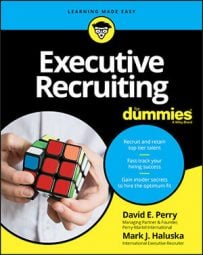Niche recruiters who focus on a particular industry are often people who used to work in that industry themselves. As a result, they know a great deal about it and have a bursting Rolodex of contacts. For example, you might see a senior semiretired HR executive set up shop to recruit HR professionals.
More often than not, a recruiter who focuses on a specific industry will brand her firm accordingly. For example, if the recruiter focuses on retail, she might name her company ABC Retail Recruiting. This type of branding is smart, because it positions the recruiter as a specialist, which makes it easy for potential clients to find him.
The fact that a niche recruiter knows your industry and has loads of contacts makes her very attractive indeed — especially if you're looking to fill a position quickly. But using a niche recruiter has some serious drawbacks:- Niche recruiters — reputable ones, at least — are often bound by "hands-off" agreements. Often, recruiters have a hands-off agreement with their clients. This agreement prevents the recruiter from poaching any of the client's employees, rendering her Rolodex essentially useless. That shrinks the talent pool from which these recruiters can ethically recruit from "Olympic-size" to "kiddie."
- Due to economic swings, niche recruiters may have a limited life span. For example, when the real estate market crashed in 2007, thousands of niche recruiters who focused on real estate or construction went belly up.
Often, generalists hold a degree in some aspect of executive management, such as industrial relations, business administration, or finance. And chances are, they've worked in one or more industry. As a result, generalists tend to be a bit more well-rounded than niche recruiters, possessing a variety of talents. Arguably, you could call a generalist a jack-of-all-trades, master of none. Generalists are master strategists and researchers, skilled at locating, assessing, and attracting talent.
So, which type of recruiter should you use — a niche recruiter or a generalist? It depends. You may want to use a niche recruiter when
- The need is urgent and time is tight (a matter of days or weeks).
- Deep domain experience is the critical business driver.
- The niche recruiter is not bound by hands-off restrictions with any of the companies you'd like to recruit from.
You may be better served by using a generalist when
- The need is less urgent and you have more time (two to four months or more).
- Deep domain experience is not the critical business driver.
- You want to attract executives who bring novel or innovative thinking from outside your industry.

